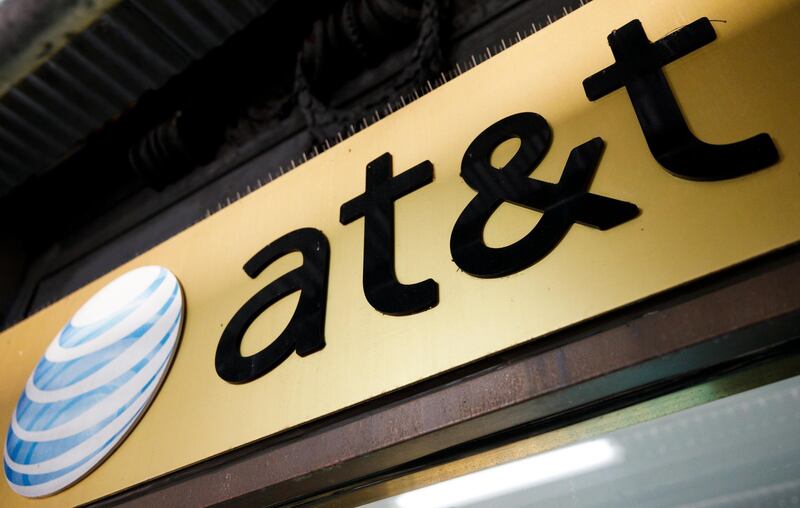AT&T's bid to create a mega media company by acquiring Time Warner was dealt a stunning blow as the government on Monday filed an antitrust lawsuit to stop the deal, claiming their combined market power would lead to higher prices for consumers.
“This merger would greatly harm American consumers,” said Makan Delrahim, head of the Justice Department’s antitrust division. “It would mean higher monthly television bills and fewer of the new, emerging innovative options that consumers are beginning to enjoy.”
The challenge is the first major antitrust enforcement action to be brought under the Trump administration. It marks a departure from decades of Justice Department practice of approving deals that unite a supplier of content and a distributor in a so-called vertical transaction. That has led some observers to say the government will have a hard time convincing a judge that the deal harms competition and should be blocked.
“This will not be an easy case for the government to win,” said Andrew Jay Schwartzman at Georgetown University’s Institute for Public Representation. “That is all the more reason to applaud the decision to file suit in the face of strong legal and political opposition.”
The challenge threatens a deal that appeared to be sailing toward approval as recently as a month ago. That was before Delrahim took up his position and took over the investigation. During negotiations he pushed for the companies to sell the Turner broadcasting unit or DirecTV, a request that AT&T rejected. The parties continued to talk as recently as last week.
The Justice Department said the Time Warner takeover would lead to higher bills for consumers and less innovation in the industry. The combined company could use its control over Time Warner programming like CNN and HBO to harm rivals by forcing them to pay hundreds of millions of dollars more per year for the right to distribute the content, the government said. The deal also would enable AT&T to impede competition from online video distributors, which would reduce choices for consumers, the Justice Department added.
The government is open to dropping the lawsuit if the companies offer a proposal to fix the competitive harm from the deal, a Justice Department official said.
AT&T said at a press briefing it is willing to offer solutions to win government approval of the deal, but would not sell CNN and is prepared for a court fight.
“Some of the best legal minds in the country believed this deal would get approved,” AT&T’s chief executive officer Randall Stephenson said at the briefing. The suit “stretches the very idea of antitrust law beyond the breaking point.”
A representative for Time Warner couldn’t be reached for comment. Time Warner shares fell 1.1 per cent to US$87.71. AT&T rose less than 1 per cent to $34.64.
____________
Read more:
[ US, AT&T at odds over CNN in Time Warner deal ]
[ Fox said to have held talks to sell most of company to Disney ]
[ Competition probe causes headache for Fox's £11.7bn bid for Sky ]
____________
AT&T is bound to put up a ferocious fight in court and may try to find out whether the White House influenced the Justice Department decision given President Donald Trump’s criticism of the deal and of CNN. In the event of a trial, AT&T intends to seek court permission to access communications between the White House and the Justice Department about the takeover.
A defeat would be a major setback to AT&T’s strategy of becoming a media and telecommunications powerhouse as the company contends with stalling growth in wireless and TV. A rejection could also slam the brakes on further consolidation in the media and telecommunications industry.
The lawsuit marks the second time in six years that AT&T’s Stephenson has found himself facing government opposition in Washington over a deal. In 2011, AT&T dropped its $39 billion bid to acquire T-Mobile US after the Justice Department sued to block that merger and the Federal Communications Commission said the tie-up was not in the public interest. Stephenson kept his job but received a $2.08 million pay cut that year for failing to successfully complete the deal.
With the proposed Time Warner purchase, Stephenson is trying to steer AT&T into media and entertainment as his company’s wireless, internet and pay-TV services businesses mature. Gaining the premium cable channels HBO and CNN, along with the Warner Bros. movie and TV studio, would make AT&T a media and distribution powerhouse with combined revenue of $192bn and an arsenal of news and entertainment properties including “Game of Thrones” and “Wonder Woman.”
The takeover is part of a trend of megadeals sweeping across media and phone-industry lines, like Comcast’s $3.8bn purchase of DreamWorks Animation and the cable giant’s plunge into TV programming with the NBCUniversal. Verizon Communications, AT&T’s closest peer, has opted to buy online properties like AOL and Yahoo in an attempt to expand beyond its slow-growing mobile service.
The AT&T-Time Warner combination doesn’t reduce the number of news outlets since it only shifts ownership of CNN from one company to another. CNN’s main competitors are MSNBC, owned by Comcast, and Fox News, which is owned by Rupert Murdoch’s 21st Century Fox.
AT&T’s scale, with national wireless and pay-TV networks, is one reason the deal has drawn even more scrutiny. A trial may reveal whether CNN’s coverage of Trump was another reason. Attorney General Jeff Sessions said he was unable to comment on “conversations or communications that Department of Justice top people have with top people in the White House” when he was asked during a November 14 House hearing whether anyone from the White House had contacted the Justice Department to interfere with or discuss the AT&T deal.
Trump spokeswoman Sarah Huckabee Sanders said Monday she’s “not aware of any specific action taken by the White House” related to the lawsuit.
While it is not illegal for Trump to make his views known to the Justice Department, the White House has traditionally stayed at arm’s length from merger reviews. Trump told reporters during his recent trip to Asia that the deal might be challenged in court.
It wasn’t just Trump who criticised the deal. Democratic lawmakers including Senator Al Franken of Minnesota and Senator Elizabeth Warren of Massachusetts told Sessions in June that the merger would lead to higher prices, fewer choices and worse service for consumers.






